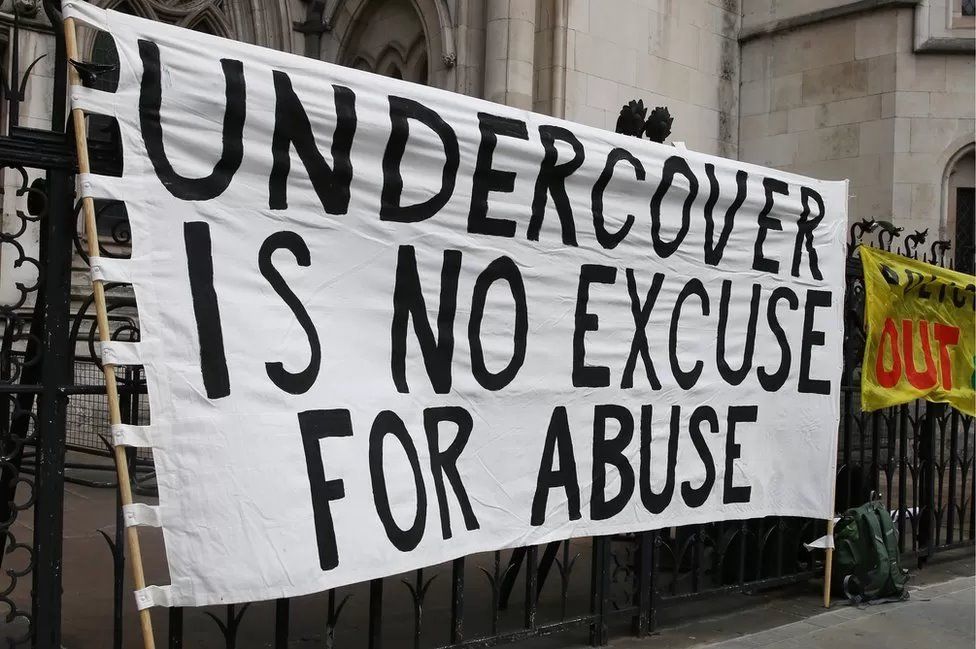
A campaigners’ banner outside the High Court
By June Kelly and Judith Burns
BBC News
The use of undercover policing tactics from the 1960s onwards was not justified and the unit should have been disbanded early on, a report says.
Ex-senior judge Sir John Mitting said most groups infiltrated by the Special Demonstration Squad posed no threat.
His report for the Undercover Policing Inquiry details tactics such as forming sexual relationships and using the names of dead children for cover.
The end did not justify the means, the report concludes.
The Special Demonstration Squad (SDS) was tasked with infiltrating left-wing political and activist groups.
Sir John describes the impact of SDS officers’ actions on hundreds of people’s lives. In some cases officers had sexual relationships while undercover and used dead children’s names to create their false identities.
He says, had the use of these means been known publicly at the time, the SDS would have been brought to a rapid end.
And he believes the tactic of taking dead children’s identities should have been referred to senior Met officers and Home Office officials.
Officers were deployed into groups for years and some took on positions of responsibility. They reported extensive details on individuals, including their relationships and family lives.
While the inquiry is covering more than 50 years of undercover policing, this first report focuses on the period 1968 to 1982. The inquiry has heard evidence from those spied on during these years. Witnesses included political activists, among them Peter Hain, now Lord Hain, who was involved in the anti-apartheid movement and went on to be a Labour cabinet minister as well as trade unionists and women deceived into relationships.
Sir John says the tactics used by the SDS should have been addressed at the highest level within the Metropolitan Police and the Home Office, which annually authorised and funded the unit. He outlines how both viewed the SDS as a potential source of embarrassment. And he says a report by senior police officers in 1976 did not address SDS tactics.
Intelligence gathered by its officers was passed to bosses at Scotland Yard and MI5.
The stated aim of the SDS was to help police control public order in London but the groups targeted were not involved in terrorism or other serious crime, says the report.
Sir John concludes that the fact that the SDS did not infiltrate right-wing groups was not because of political bias. He says those running the unit decided these groups were already covered and they were concerned about the risk of violence.
Image source, PA
Lord Hain was monitored in his youth – and when he became an MP
Lord Hain said the report revealed “clear political responsibility for illegitimate undercover police operations, targeting anti-apartheid and anti-racist groups, going right up to prime ministers of the day”.
However he said Sir John’s statement that the decision not to infiltrate right wing groups did not stem from political bias was “an astounding endorsement of the very political bias the police and security services displayed at that time”.
Baroness Doreen Lawrence, whose campaign for justice for her murdered son Stephen was spied upon, said: “I now want to know who ordered the spying on me and my family.
“Who thought it necessary to intrude on a law-abiding family fighting for justice for their son? Who signed off on this unlawful practice?”
Image source, AFP
Stephen Lawrence was murdered by a gang in 1993
The campaign group Police Spies Out Of Lives said: “Thanks to years of efforts by campaigners the authorities are now on the back foot.”
Kate Wilson, speaking on behalf of the group, was herself deceived into a relationship with an undercover officer and said: “This is not only about human rights abuses that happened in the 1970s, this is about the Metropolitan Police, the Home Office and MI5 perpetuating human rights abuses… for more than four decades… and what the inquiry now has to look at is how did that go on for so long?”
The inquiry heard evidence that those targeted included trade unionists who suffered years of unemployment after being spied on by police.
Dave Smith from the Blacklist Support Group said: “They’ve taken food off my kids table and we’re rightly outraged because of this.”
Metropolitan Police Cdr Jon Savell said: “We know that enormous distress has been caused, and I want to take this opportunity to reiterate the apologies made to women deceived by officers into sexual relationships, to the families of deceased children whose identities were used by officers, and to those who suffered a miscarriage of justice because of the actions of SDS officers.
Cdr Savell said he wanted to reassure the public that undercover policing had undergone radical reform over the years, and now “bears no relation” to the way it was conducted in the 1970s.
The Undercover Policing Inquiry was set up in 2015 and began hearing evidence in 2020. It has so far cost over £64m. Its final report is currently scheduled for 2026.
In his foreword, Sir John, says the report published on Thursday is part of a work in progress and the inquiry will in future consider the full impact on women deceived into sexual relationships with undercover officers, as well as the effect on officers’ families.
Future reports will also address the impact on the relatives of deceased children whose identities were used by officers and ask why justice campaigns like that for Stephen Lawrence were targeted, he adds.








